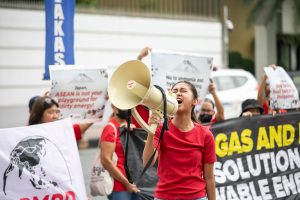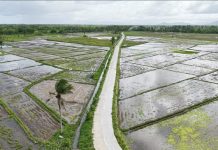TACLOBAN CITY-Filipino environmental activists held another round of protest action in front of the Japanese Embassy to oppose Japan’s “dirty energy strategy ‘Green Transformation,’ that promotes gas and LNG projects in Asia.”

(Photo by John Louie Abrina)
“Japan is the world’s largest provider of public finance for gas and LNG projects, at the cost of ASEAN’s energy security. Its ‘Green Transformation’ (GX) policy is a massive investment strategy that promotes LNG, hydrogen, ammonia, and other false solutions that exacerbate – rather than solve – the climate crisis,” said Lidy Nacpil, coordinator of the Asian Peoples’ Movement on Debt and Development (APMDD), on December 15, 2023.
APMDD, together with its partners from the Fossil Free Japan coalition, staged the rally as the ASEAN-Japan Friendship and Cooperation commemorated its 50th anniversary in Tokyo from December 16 to 18.
“The Tokyo Summit provides an opportunity for Japan to start meeting their historical obligations to their citizens and to the Global South. However, their current energy strategy only benefits the corporate interests and not the people and communities of ASEAN,” Nacpil said.
“This kind of energy strategy only causes more harm and dangers from the impacts of and the uncertain future of the climate crisis,” she added.
Chanting “Japan, Don’t Gas Asia!” the organizers denounced Prime Minister Fumio Kishida’s administration “for continuing to be the world’s top public financier of fossil fuels.”
In a statement, APMMD maintained that “Japan’s harmful tactics and wrong policies that promote dirty energy are doing irreversible damage to a region that already suffers the effects of climate change.”
They also underscored that Japan’s influence in the Southeast Asian region means a possibility of Japan exporting more fossil fuel projects in their region.
Simultaneous rallies were held to for the climate campaigners to show “fierce resistance” to Japan’s “dirty energy strategy and the promotion of false solutions which it upholds under the guise of ‘decarbonizing Asia.’”
Sharif Jamil, coordinator of Waterkeepers Bangladesh, noted that “Japan is risking its reputation by continuing to fund dirty fossil fuels and being the top financier of LNG worldwide.
“It should make the crucial decision of phasing them all out and build an ambitious goal towards 100% renewable energy,” he said in a statement.
Rere Christanto, WALHI’s Campaign Manager on Mining and Energy, added that “Indonesia absolutely refuses to be a playground for Japan’s dirty technologies like fossil hydrogen and ammonia.
“The only future we see is one with renewable energy,” the campaign manager added.
According to APMDD, Japan “is the world’s second largest provider of public finance for fossil fuel projects, investing $9.7 billion into coal, gas and oil annually from 2017 to 2021.”
Citing a report from Center, Energy, Ecology and Development, APMDD said Japan “is the second-biggest financier of gas expansion in Southeast Asia, spending around $15 billion between 2016 and 2022.”
(RONALD O. REYES)



